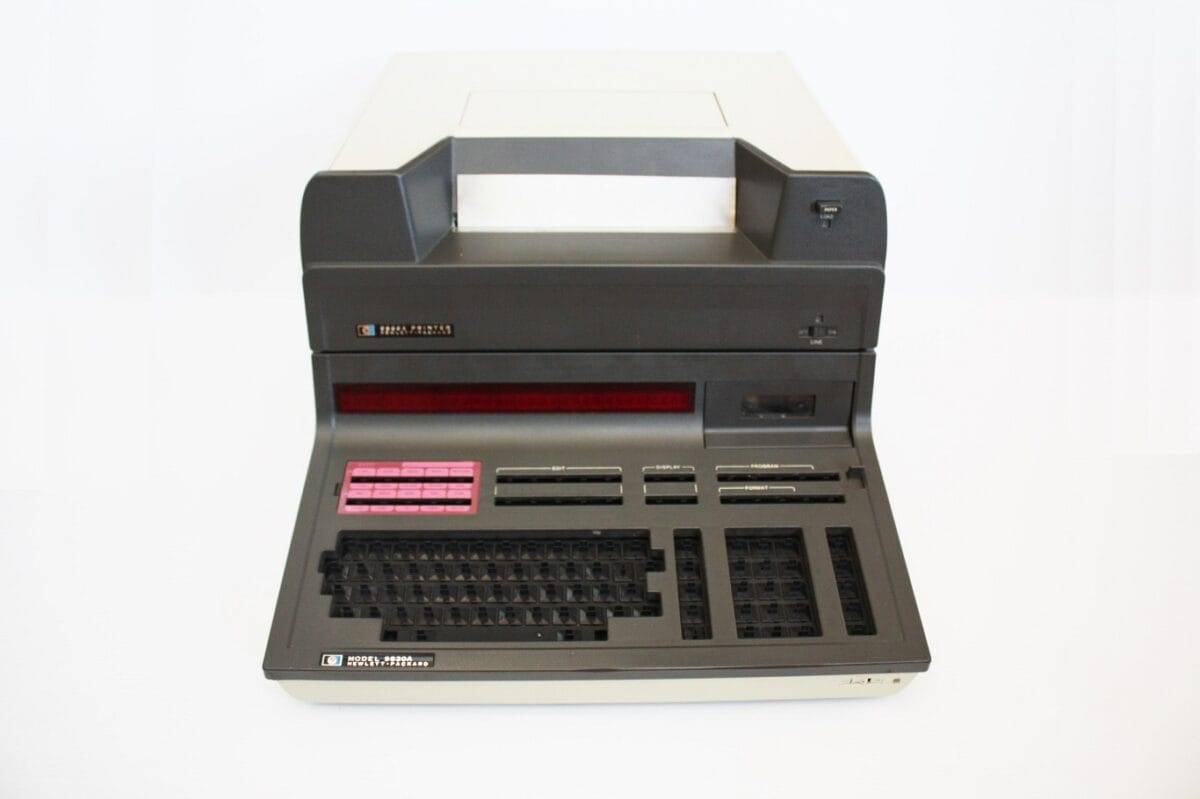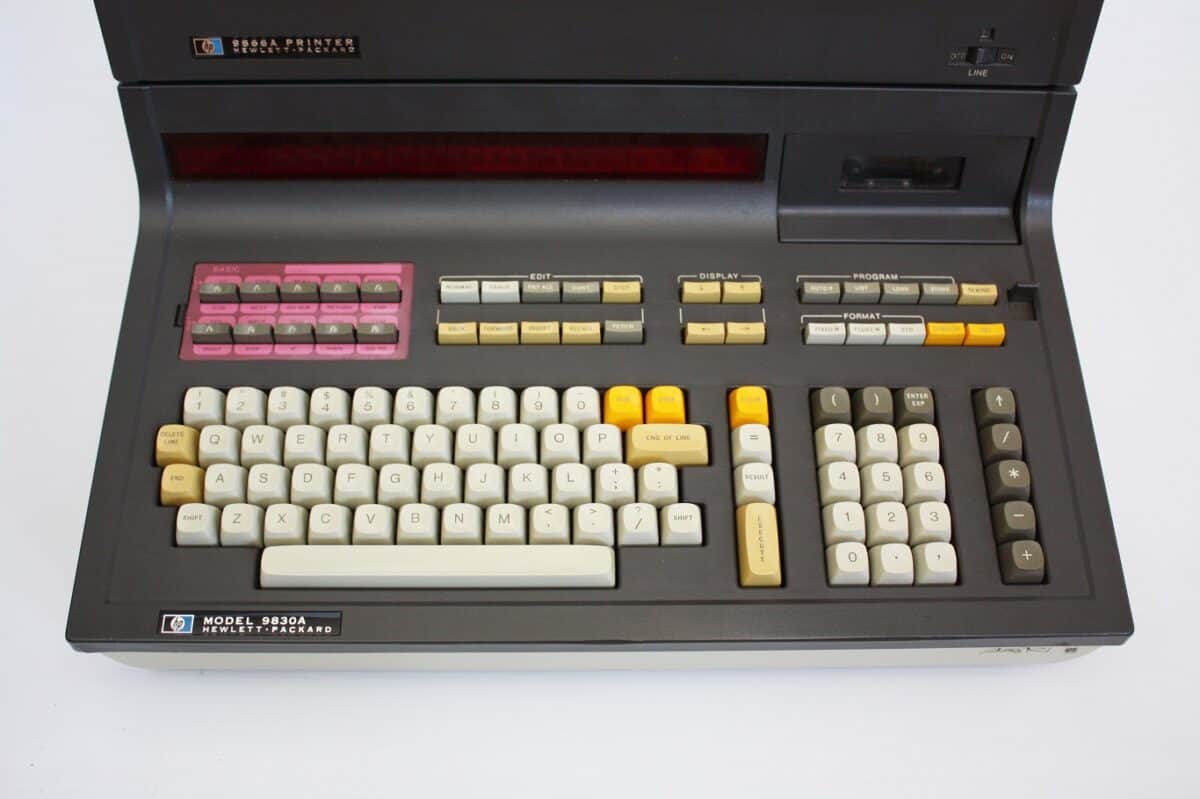From today’s perspective, a calculator is decidedly not a computer. You couldn’t do a fraction of the things on a calculator that you could do on a computer. However, looking back at the origins of the computer and its relation to the history of the calculator, it’s clear to see that the two have a lot more in common than one might initially believe.
This is especially obvious when looking at the Hewlett Packard 9830A programming calculator, also known simply as the HP 9830A. One of the earliest devices to be considered a personal computer, the HP 9830A has a rich and fascinating history that leads directly into the invention of the PC. From its early origins to its eventual discontinuation, here’s everything you need to know about the HP 9830A.

HP 9830A complete computer with printer (no key caps)
©Snuci, Public domain, via Wikimedia Commons – Original / License
3 Facts about the HP 9830A
- HP 9830As were incredibly popular among aerospace engineers and saw plenty of use in professional settings such as Boeing and the U.S. Coast Guard.
- The HP 9830A predates the iconic early Apple and IBM PCs.
- The HP 9830A was one-fourth of the 98 line, which also included the HP 9810A, the 9820A, and the 9821A. Each had a unique set of functions while maintaining the same BASIC operating system and ROM across the four 98 products.
HP 9830A Specs
- 4-64 kB of read-only memory (ROM)
- A standard QWERTY keyboard for data and text entry
- An alphanumeric display with single line, 32-character red LEDs
- BASIC processor
- A built-in cassette tape drive
- Three internal and five external slots to install ROM modules for additional capacity and peripheral control
- An optional HP-9866A printer
- Four external slots to interface with printer, plotters, digitizers, and other I/O devices
- 25 x 16 x 7” and a weight of approximately 44 pounds (20kg)
The History of the HP 9830A: What to Know
After the success of Hewlett Packard’s groundbreaking programming calculator 9100A, the next step for HP was to update the tech for a second generation. This is where the HP 9830A comes into play: one of four different models that succeeded the 9100A, the 9830A — alongside the 9810A, the 9820A, and the 9821A — took programmable calculators to the next level.
Announced in December of 1972 and released to the general public not long after at the start of 1973, the HP 9830A was considered the best of the best of this so-called 98 line. The 9830A was considered the cream of the crop of the 9800 family, complete with a BASIC processor in its read-only memory (ROM). While HP referred to the 9830A as a calculator, it was much closer in function to an early personal computer: It plugged into the wall, it could hook up to a printer, it was programmable, it had a processor, ROM, a keyboard… the list goes on and on, each feature taking the technology’s classification further from a calculator and closer to a computer.

Hewlett-Packard 9830A Desktop Calculator
©Snuci, Public domain, via Wikimedia Commons – Original / License
The HP 9830A was capable of so much, but its tape drive and its printer were the real draws. The built-in cassette drive had a tape length of 90m and was operated using the control keys on the keyboard. The drive held up to 64 kB of data and had a search bidirectional speed of 660mm/sec and a read/write speed of 250mm/sec. The optional HP-9866A printer featured a full page-width, high-speed, thermal-line printer that was capable of printing at incredibly high speeds — up to 240 lines per minute with 80 characters per line, to be specific. Oddly enough, it would print one row of dots across the full width of the page at once. Instead of the printer moving, the paper would scroll to complete the job.
With all its features and extras and innovative tech, it’s no surprise that the 9830A was a huge success for HP. Still, there was room for improvement. As such, a slew of third-generation 9800s hit the market between 1973 and 1975 while the 9830A was slowly phased out and eventually discontinued.
The Public Response
Given the sheer number of functions and features that came with the 9830A and the rest of the 98 line, it’s no surprise that the public found all sorts of important uses for the calculator-computer hybrid. From grade schools to the aerospace industry to the US military and everything in between, the 9830A was a jack of all trades for both amateurs and professionals alike because of its simplicity and user-friendliness combined with the sheer number of customizations and add-ons available for those wishing to take their tech even further than the basic model that came out of the box.
However, this is one key aspect of the HP 9830A that served as a real drawback: its initial price point and the cost of all the add-ons available on the market. In addition to going for nearly $6,000 at the outset, each additional bit of ROM and each new device added on would cost users even more (nearly $500 per ROM for only an additional 2kB of memory). The average consumer simply couldn’t afford all this — especially when $6,000 in 1972 comes out to be over $40,000 today.